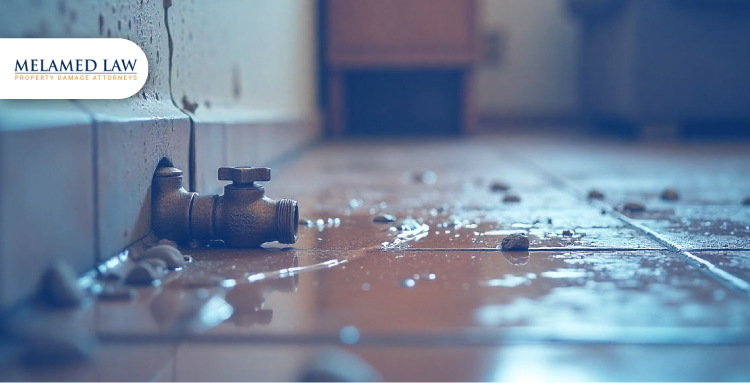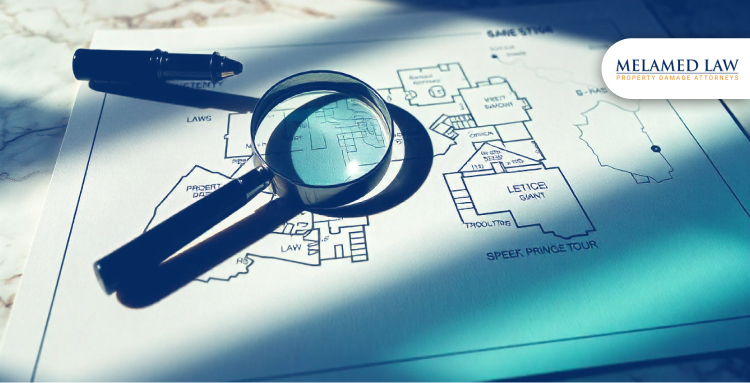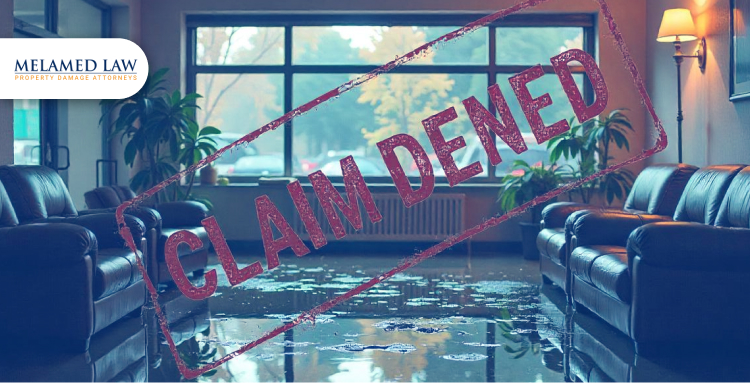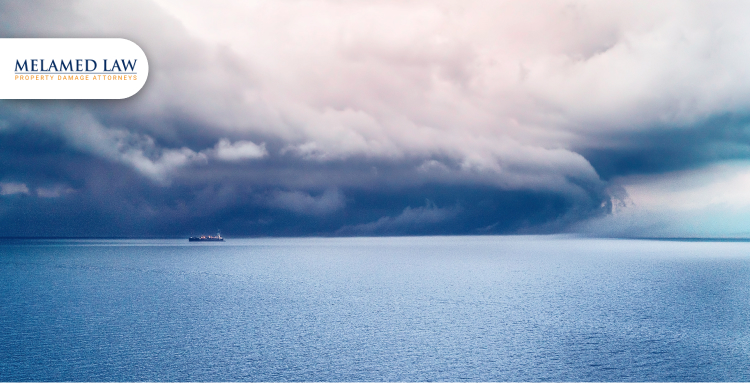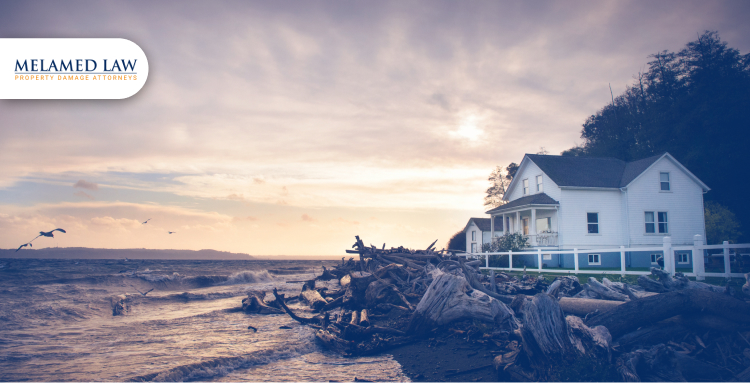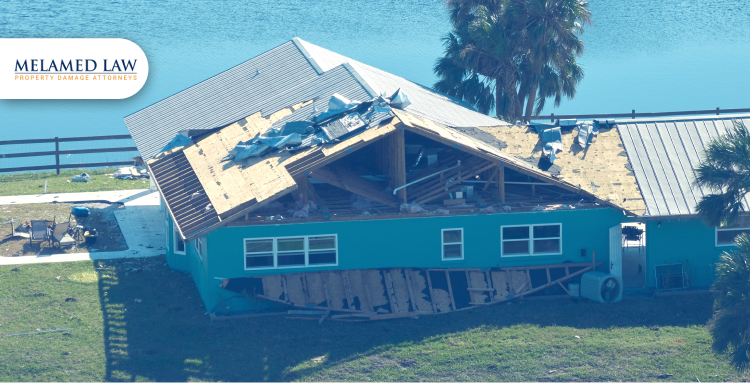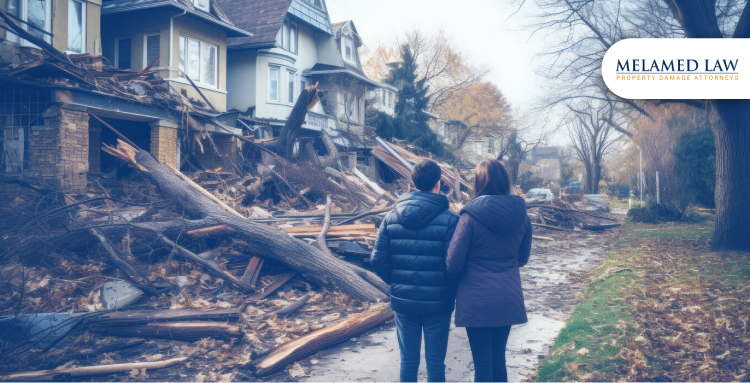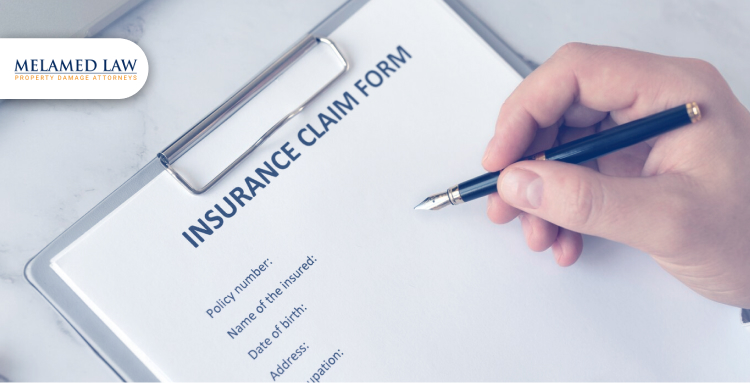
What Should I Do to Prepare for a Hurricane (Both for Household and Evacuation)?
When the unexpected happens, we help individuals and businesses collect the money they deserve for their insurance claims.
Melamed Blogs
April 6, 2025
What Should I Do to Prepare for a Hurricane (Both for Household and Evacuation)?
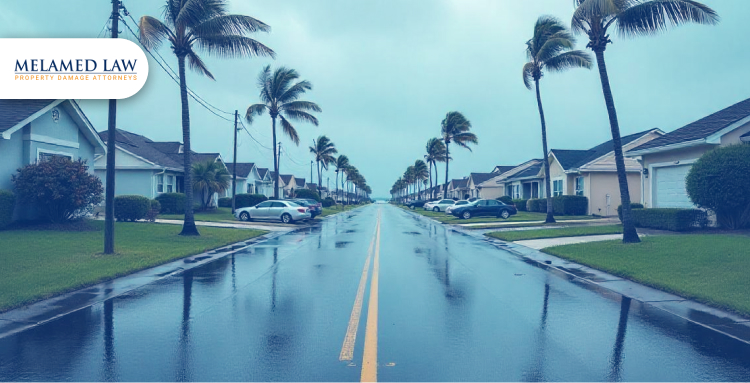
Stretching from June 1st to November 30th, the season peaks between August and October, a time when the warm waters of the Atlantic and the Gulf of Mexico become a breeding ground for powerful storms. History has shown us the devastating impact hurricanes like Andrew, Irma, and Michael have left in their wake, reminding us of the importance of proactive preparation.
Hurricanes don’t just bring fierce winds; they also cause storm surges, flooding, and extended power outages that can disrupt daily life for weeks. Understanding past hurricane patterns and being aware of peak activity months can give Floridians a crucial edge in preparing for the unexpected.
1) How to Assess Your Home's Vulnerability to Hurricanes
Before preparing your home for a hurricane, you must first assess its vulnerability. A home that is structurally sound and equipped with the right protective measures is better able to withstand a storm’s impact. Consider the following factors when evaluating your home’s resilience:
Roof Integrity
Your roof is one of the most vulnerable parts of your home. Check for loose shingles, cracks, or leaks, as these can become major issues during a hurricane. A properly maintained roof ensures that strong winds won’t tear it off.
Window Strength
Windows are susceptible to breaking under high winds. Assess the strength of your windows and consider upgrading to impact-resistant ones or installing storm shutters.
Structural Resilience
Inspect the foundation, walls, and structural components of your home. A strong, reinforced structure can prevent severe damage.
2) How to Strengthen Your Home Against Hurricanes: Essential Tips
Once you've identified potential vulnerabilities, there are steps you can take to strengthen your home:
Installing Impact-Resistant Windows and Doors
Impact-resistant windows and doors are designed to withstand high winds and debris. Installing these is one of the most effective ways to protect your home from hurricane damage. While the initial cost can be high, the long-term benefits in terms of safety and reduced repair costs make it a worthwhile investment.
Reinforcing Roofs and Securing Loose Items for Hurricane Safety
A sturdy roof can withstand much of a storm’s force. Reinforce your roof trusses and ensure that shingles are secure. Inside your home, take the time to secure or store away any loose outdoor items like patio furniture, tools, or lawn equipment, which can become dangerous projectiles in high winds.
Using Storm Shutters and Protective Coverings Effectively
Storm shutters are essential for protecting windows and doors. If you don’t have impact-resistant glass, installing shutters can significantly reduce the risk of breakage. For added protection, consider boarding up windows with plywood.
3) Creating a Comprehensive Hurricane Emergency Kit: What You Need
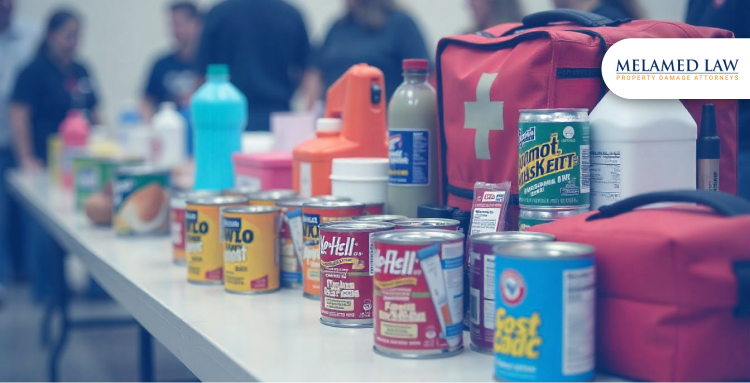
One of the most critical aspects of hurricane preparedness is having a well-stocked emergency kit. This kit should contain everything you need to survive for at least 72 hours after the storm has passed.
Essential Supplies for Hurricane Preparedness
Your emergency kit should include:
Non-perishable food and water (enough for at least 3 days)
Battery-powered flashlights and extra batteries
First aid supplies
Personal hygiene items
A portable phone charger
Extra clothing and blankets
A multi-tool or basic tools
Prescription medications and glasses
Special Considerations for Pets, Babies, and Important Documents
Make sure to include pet supplies, such as food, water, and medications, as well as baby essentials like diapers and formula. For important documents, make copies of IDs, insurance policies, and medical records, keeping them in waterproof and fireproof containers.
Best Storage Solutions for Your Emergency Kit
Consider investing in clear, durable plastic bins with airtight seals for easy organization and access. Label each container clearly to help quickly identify its contents.
4) How to Develop a Family Emergency Plan for Hurricane Evacuation
Preparing your home is important, but it’s equally vital to have a solid evacuation plan for your family. This plan will help ensure that everyone knows what to do in case you need to leave your home.
Communication Protocols and Meeting Points During a Hurricane
Decide on a communication method if phone lines are down. Identify a safe location, such as a neighbor’s house or a public shelter, as a meeting point. Make sure all family members know how to reach each other.
Designating Evacuation Routes and Responsibilities for Family Members
Familiarize yourself with nearby evacuation routes and have multiple options in case one becomes blocked. Assign clear responsibilities to each family member, such as who will pack the emergency kit, who will check on neighbors, and who will drive the vehicle.
Understanding Florida’s Evacuation Zones and Legal Implications
Evacuation orders are issued based on zones that cover the most vulnerable areas. It’s essential to understand which zone you are in and the legal implications if you fail to comply.
5) How to Determine Your Evacuation Zone in Florida
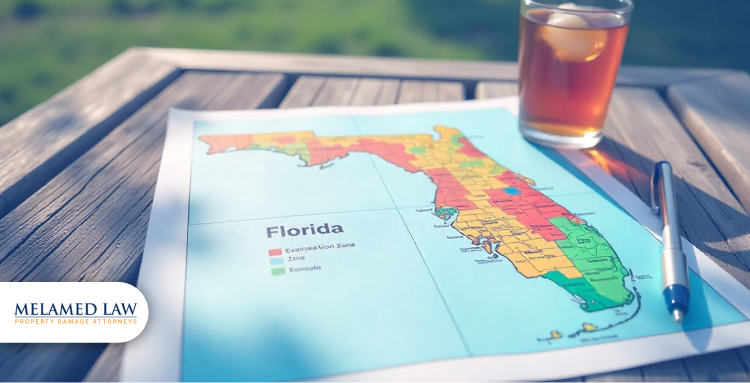
You can find your evacuation zone by visiting local government websites or using tools like the Florida Division of Emergency Management’s evacuation zone finder. Knowing your zone will help you respond quickly when evacuation orders are issued. To learn more about evacuation zones and real-time updates, visit the Florida Division of Emergency Management.
Legal Implications of Evacuation Orders in Florida
Evacuating when instructed is not only crucial for safety but may also have legal implications. Failing to evacuate could potentially result in legal consequences, especially if emergency responders need to divert resources to rescue those who ignored orders.
Resources for Real-Time Updates and Alerts
Stay informed with real-time updates from sources like the National Hurricane Center, local news stations, and emergency management agencies. Additionally, consider downloading weather apps such as the American Red Cross Emergency App for instant notifications and guidance.
6) Preparing Your Vehicle for Hurricane Evacuation: A Complete Guide
A full gas tank ensures that you have enough fuel to evacuate if needed. Gas stations may be closed or overwhelmed during a hurricane, making it difficult to refuel. Keep your tank at least half full to avoid this issue.
Packing an Emergency Car Kit with Essential Tools and Documents
Your vehicle should have an emergency kit containing:
Water, snacks, and a flashlight
A first-aid kit
A tire repair kit and jumper cables
A portable phone charger
Copies of important documents
Planning Alternative Routes for Hurricane Evacuation
Primary evacuation routes can become blocked with traffic or debris. Identify at least two alternative routes by considering road conditions, traffic patterns, and the overall distance.
7) How to Secure Important Documents Before a Hurricane Hits
Important documents are often irreplaceable, so it’s crucial to keep them safe and accessible during a hurricane.
Creating Digital Backups of Critical Documents for Hurricane Season
Scan and store copies of your critical documents, such as insurance papers, IDs, and legal documents, in digital form. Cloud storage services or external drives are reliable options.
Storing Important Documents in Waterproof and Fireproof Containers
Store physical copies of critical documents in waterproof and fireproof containers. These containers can withstand flooding and the heat from a fire, providing peace of mind during the chaos of a storm.
8) How to Protect Your Pets and Livestock During a Hurricane
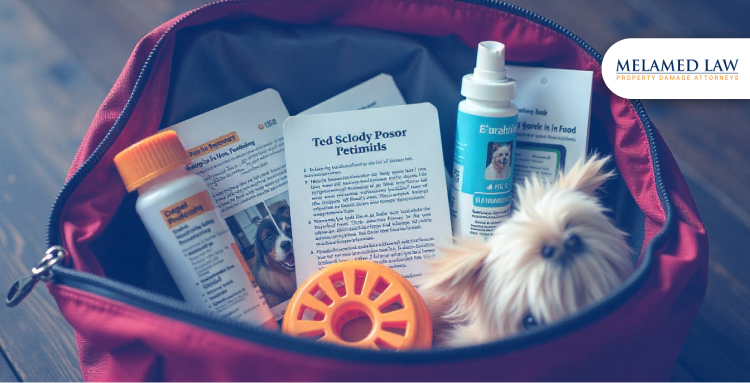
Your pets and livestock also need to be included in your hurricane preparedness plan.
Assembling Pet Emergency Kits and Identifying Pet-Friendly Shelters
Ensure your pet's emergency kit includes food, water, medications, leashes, and vaccination records. Research pet-friendly shelters in your area or make arrangements for where to take your pets if you need to evacuate.
Planning for Livestock Evacuation or Shelter During a Hurricane
For livestock, plan ahead by identifying evacuation routes to animal shelters or safe locations. Work with local agricultural agencies for advice on managing livestock during a storm.
9) Financial Preparedness for Hurricane Season: Insurance and Budgeting Tips
Insurance is a crucial aspect of hurricane preparedness, but it’s also essential to have the right financial plan in place.
Reviewing and Updating Your Insurance Policies for Hurricane Protection
Ensure that your homeowners and flood insurance policies cover hurricane damage. Make sure your coverage includes replacement costs and is adequate for rebuilding after a major storm.
Documenting Your Home Inventory for Insurance Claims After a Hurricane
Keep a detailed inventory of your home’s belongings, including photographs and receipts, to streamline insurance claims if damage occurs. This documentation can speed up the claims process.
Setting Aside Emergency Funds for Unexpected Hurricane Expenses
Set aside emergency funds to cover out-of-pocket expenses, such as temporary lodging or emergency repairs. Financial preparedness will reduce stress when unexpected costs arise.
10) Community Support During a Hurricane: How to Help Neighbors and Stay Safe
Hurricane season isn’t just about personal preparedness; it’s also about helping your community.
Establishing a Neighborhood Watch and Assistance Network
Set up a neighborhood watch to share information and resources. A network of neighbors can provide assistance with evacuations, check on vulnerable residents, and offer help during the recovery phase.
Sharing Resources and Information with Neighbors During a Hurricane
During the storm, maintain communication with neighbors, sharing vital resources like food, water, and medical supplies. By pooling resources, you can help everyone stay safe.
Volunteering for Local Emergency Response Teams
Get involved with local volunteer organizations or emergency response teams. Your efforts can make a significant impact on the recovery process in your community.
Want additional information? Explore our related articles:
How does hurricane insurance coverage differ from standard homeowners' insurance policies?
What is the plan for rebuilding Tropicana Field after the damage caused by Hurricane Milton?
How Melamed Law PLLC Can Help with Hurricane Preparedness and Recovery
The impact of a hurricane can leave you facing unexpected hurdles, but having reliable legal support can ease the burden. We’re ready to stand by your side and help you protect what matters most. We assist with insurance claims to ensure you receive fair compensation for property damage and losses, and we provide skilled representation for disputes with insurance companies or other legal issues related to hurricane recovery.
Our team is committed to offering comprehensive support to help you prepare, protect, and rebuild. If you need legal guidance before or after a hurricane, we’re just a call away—contact us today.
Recent Cases




